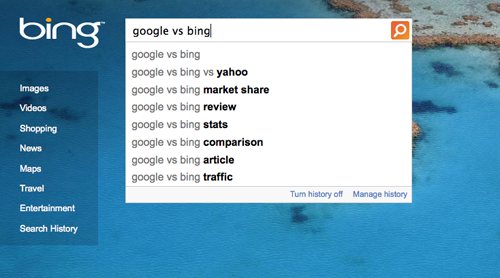
If you type “Bing vs. Google” into either search engine, you will get the same search suggestions in both. Google’s lawyers say these searching similarities are no coincidence.
Launched by Microsoft on June 3, 2009, the Bing engine has emerged as a real rival to Google.
Google, which owns 65percent of the U.S. search market, has become synonymous of searching. However, Bing is surging in popularity, thanks in part to recent deal with Yahoo!
“This is about two smart search engine algorithms,” Dr. Rajan Alex, associate professor of engineering and computer science at WTAMU, said.
And then allegations surfaced that Microsoft had stolen some of Google’s algorithms.
As Amit Singhal, a software engineer at Google told National Public Radio on Feb. 2, employees got suspicious when they noticed Bing began adding search suggestions to their engines weeks after they appeared on Google.
Singhal and his team began experimenting by creating made-up words and generating fake results related for those words.
“Microsoft’s Bing started showing the same artificial result for the same synthetic query,” Singhal said to NPR. “And this was just conclusive to us at that point.”
But Microsoft tells a different tale about Bing.
Yusuf Mehdi, senior vice president of Microsoft’s Bing, told NPR, “We do not copy their results. Period. Full stop.”
In other words, Microsoft claims that Google is stirring up controversy because it wants to harm its rival’s reputation.
According to the Department of Computer Information & Decision Management Department Head at WT, Dr. Amjad Abdullat, there may be some truth to this.
“The new computing platforms are changing,” Abdullat said. “Google is becoming of a multimedia and search engine company.” The company is also focusing on mobile and wireless.
In his opinion, Bing is an attempt by Microsoft to move into this market and it has been somewhat successful. Bing has been much better received than Microsoft’s old MSN search engine.
When it comes to toppling the king, though, experts agree Microsoft made its move too late.
“I think Microsoft came late [to search engines],” Abdullat said. “Google had already established themselves.”
“There is some question about whether it [Bing] had been a success compared to Google,” Alex agreed.
Business politics aside, the questions of plagiarism remain unanswered, and may for some time.
“When it comes to copyright issues, only the court will determine that,” Abdullat said.
According to Abdullat, however, legalities are more important than image.
“I think Google’s making a mistake, accusing Microsoft of something that is hard to prove,” Abdullat said.







